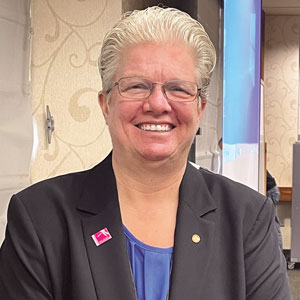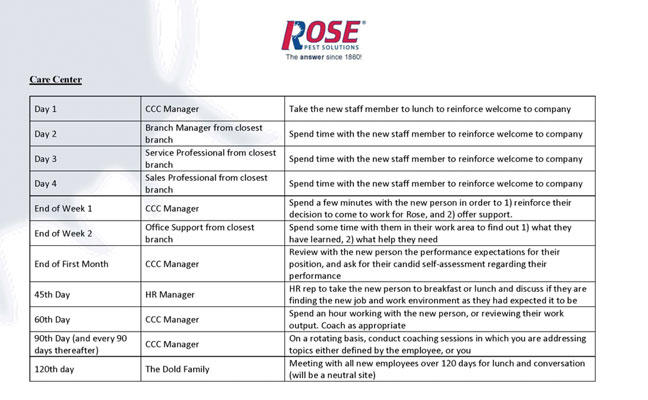
Illustration: Abscent84/iStock / Getty Images Plus/Getty Images
Before the 87th Purdue Pest Management Conference took place on the university’s West Lafayette, Ind., campus on Jan. 9, the Indiana Pest Management Association (IPMA) presented a Business Workshop exclusively for pest control firm owners. The annual workshop is a popular event every year, and the 2023 edition, which featured Angie Persinger, PHR, the human resources manager for Rose Pest Solutions in Chicago, Ill., was no different.
The title of her presentation was “Retention, Recruitment and Diversity,” and Persinger spoke to a large and attentive audience.
Even a company as large and successful as Rose Pest Solutions, which was founded in 1860 and run today by Pest Management Professional Hall of Famers Bob and Judy Dold (Class of 2002) with their son Bob Jr., still faces challenges when hiring quality employees. Persinger said that by casting a wider net in the candidate pool, the challenges have become minimized.

Angie Persinger
“Referrals from existing staff are great, but they need to be as vetted as someone who applied off the street,” she pointed out. “We have to remember, not every potential employee is a Rose employee.”
While using websites like Indeed.com have been helpful (and even more so when you sponsor an ad on them to keep your name up near the top of the results), she said really thinking about the target candidate made a difference.
“We had a lack of good candidates at one point, and that’s when we took a closer look at the way the job posting was written,” she recalled. “The description focused on industry experience because we thought, well, this person needs to hit the ground running. But we can teach the technical stuff. What was missing was a focus on customer service. That’s a big part of being a service professional, and it’s a skill many people who otherwise would not have even thought about applying possess.”
Even if you’re not in the market to hire, Persinger said, take a critical look at your current website, social platforms and community initiatives so you are expanding your pool of potential, qualified candidates. Are women and minorities represented in your branding? Are there people of different heights, weights and ages?
“Just to focus on attracting more women service professionals, for example,” she offered. “If you have women in leadership roles at your company, show their photos and biographies. Put them on your company’s Career Page on your website, and if you don’t have such a page, make one. Add a video of a ‘Day in the Life’ of their jobs, so women seeking to apply at your company will see there is representation there, and that pest control is a viable career opportunity regardless of gender.”
Another way to get your company name to become synonymous with inclusion and diversity is to sponsor scholarship and outreach programs in your community. Persinger explained Rose Pest Solutions works with local Girls Scouts programs to establish a positive reputation among what they consider potential future customers and employees (and their families).
A long-term commitment
“If your company’s diversity efforts stop at the hiring stage, it will be difficult to retain,” Persinger pointed out. “You need to invest in your team long-term in two ways: ‘re-recruiting’ and ongoing training.”

The Rose Pest Solutions leadership makes various efforts to ensure every employee is treated like family. From left are the Dolds: Judy, Bob Jr. and Bob Sr. PHOTO: ROSE PEST SOLUTIONS
As seen in the chart depicted on the facing page, Rose Pest Solutions has developed a “1- to 120-day” program for every new hire, to ensure the person feels welcome and included not only at the start, but as the job training progresses.
“Over that starting period, we’re ‘re-recruiting’ the new hires by having them sit down with the manager, the branch manager, a service professional, a salesperson, an office person,” Persinger explained, adding the meetings are intended to be casual and to learn more about each employee. “On their 120th day, they have lunch with the Dold family. It makes every employee feel like part of the family.”
Ongoing training is not only required in most markets, but signals to employees that being equipped with the latest and most accurate information to do their jobs to the best of their abilities is a priority at your company, Persinger said. Across all industries, many of today’s workers put a high priority on feeling valued by their employers, and offering educational opportunities is just one of many ways to accomplish that.
Another way, she said, is to reward and recognize. Rose Pest Solutions uses a smartphone app called Bonusly (online at Bonus.ly) where employees can earn “points” toward gift cards and more for going above and beyond on the job. As the Bonusly website itself points out, companies that use employee recognition programs are up to 20 percent more profitable than those that don’t.
Persinger was quick to add that employees who don’t want to opt into such a program certainly don’t have to. “We’ve got about 86 percent participation, and the response has been enthusiastic,” she continued.
Addressing all sides of diversity
Diversity is more than skin deep, although race is certainly part of the equation, Persinger said. But candidates and employees who are differently abled or of different ages, religions, sexual orientation, etc. — these differences are what can make your company not only richer in experiences, but more marketable to a wider audience.
Why add “native English speaker” on the job posting, for example, if a bilingual person can help with customers who are non-native speakers? It also could intimidate a person for whom English is a second language and keep them from applying, even though they speak and understand English just fine, Persinger pointed out.
Yes, getting a respirator fit test is easier for a non-bearded person, but getting one tested for a bearded person isn’t impossible — and simply saying “no facial hair” can be interpreted not only as discriminatory against certain religions, but also for women who read it and assume it’s not even an option for applying.
“Instead of ‘clean-shaven,’ say ‘professional appearance,’” Persinger advised, noting that it still conveys your desire to not have a slob on the job, regardless of hair preferences.

Chart: Rose Pest Solutions
“Hewlett Packard put out a study that noted that many men apply for a job if they met 60 percent of the listed qualifications,” she said. “Many women, by contrast, only applied if they met 100 percent of the qualifications. To keep from shutting them out of the process, eliminate what is not germane to the position. Keep it short and sweet.”
Obviously, must-haves like a high school diploma and good driving record are key. But do you need that “young, energetic, go-getter”? The “digital native,” which cuts out everyone born before 1980? A “work hard, play hard” attitude? “Be realistic,” Persinger said. “The more parameters you put on, the more risk there is of whether your ideal person even exists.”
When the resumes come in, she added, try to review them without looking at their names. “Everyone has an unconscious bias,” she said. Even having the same last name as someone you know could affect you positively or negatively — and that’s not fair to the candidate, whose skillset and experience should be the focus, not who a relative is.

The right fit for your company is someone who has good ethics and the desire to help the team succeed; different looks, personalities and other qualities can definitely still qualify. Illustration: Overearth/iStock / Getty Images Plus/Getty Images
Before taking several questions from the audience, Persinger wrapped up her presentation with three steps for pest control company leaders to take to make their hiring and retention processes more equitable and open to all qualified candidates:
- Educate your team on how to be welcoming to every new hire. Not everyone has to be best friends, but a little kindness and positivity can go a long way.
- Hold everyone accountable. There should be a zero-tolerance policy for discrimination of any sort. It should be in writing, it should be commonly known throughout the workplace, and it should be implemented.
- Make inclusion a priority. This is not about filling a quota, but rather, getting out of what might be a “comfort zone” for the team. New voices can bring new ideas and experiences to the table and can make your company better for it.
Embracing diversity goes beyond the office, too, Persinger said. When a company owner in the audience recounted how a minority employee quit, but he didn’t realize why until much later that it was over a commercial account that was treating the person poorly, she said such a situation is why employees should know from the start that their employer will stand by them. On the other hand, management can only intervene if they are aware of the situation.
“The customer is not always right. Not every customer is a Rose customer,” she said. “We’ve canceled accounts over people who are mistreating our employees. You must stick with your values and stand up for what’s right.”
Leave A Comment